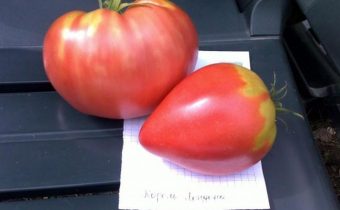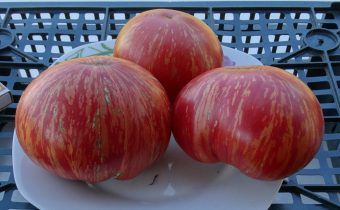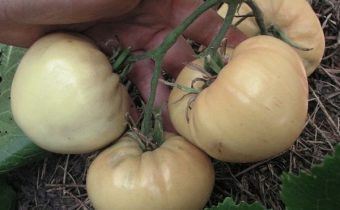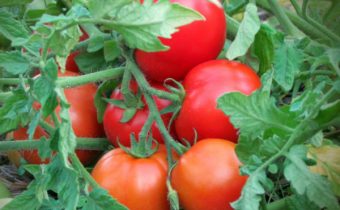Tomato "The King of the Early": the name speaks of itself
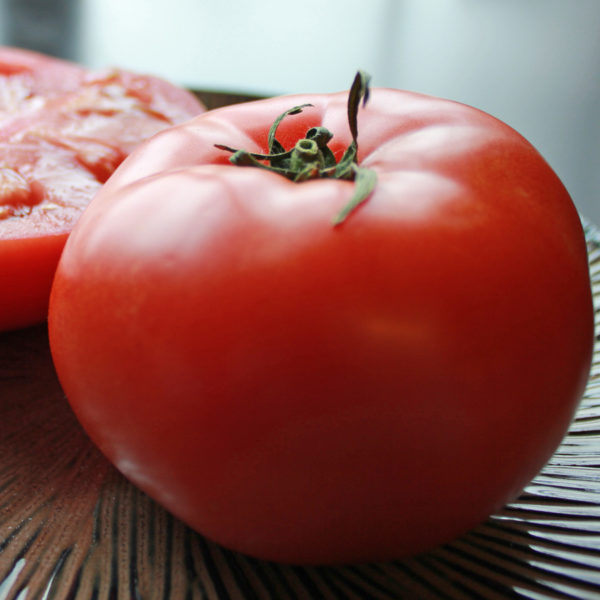
Considering a tomato “The King of the Early”, a characteristic and description of the variety, as well as a photo, suggests that this tomato is of unknown origin.
general information
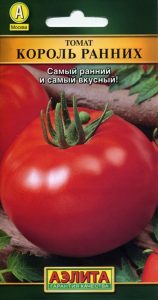 The variety “King of the Early” in the register of breeding achievements of the Russian Federation, Ukraine and Belarus does not appear.
The variety “King of the Early” in the register of breeding achievements of the Russian Federation, Ukraine and Belarus does not appear.
The company "Seeds of Altai" with the indication "Our selection" packs up this "king". In this case, who is the author and originator of the variety is not specified, but there is a note that the selection of the Agricultural Company "Seeds of Altai".
It is no secret that it is not easy to introduce a variety in the register of breeding achievements, and this takes time. Perhaps in the future there will be a test of the variety and the commission will allow him to enter the registry, but so far this has not happened.
Agrofirma "Seeds of Altai" gives the variety as early ripe with the ability to grow in closed and open ground.
There is another packer on the market. "The King of the Early" tomato from "Siberian Garden, reviews indicate, and the manufacturer himself says that the tomatoes are early and crimson in color, and its yield is up to 4 kg from a bush.
Characteristics and description
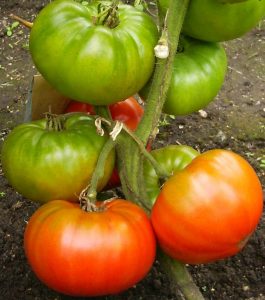 The vegetative form of tomato is compact, undersized, determinant. The manufacturer indicates that each tomato brush carries 3-5 fruits.
The vegetative form of tomato is compact, undersized, determinant. The manufacturer indicates that each tomato brush carries 3-5 fruits.
Considering a tomato “King of the Early” reviews, photos, who planted vegetable growers, sharing impressions, indicate that the tomato sets fruit very early and their ripening begins with a simultaneous growth.
Fruits are large, weighty, reaching 200 g and having a flat rounded and rounded shape. At the same time, the same shrub can carry on itself both ideally round, smooth fruits, and flattened and with light ribbing.
The color of a fully ripened tomato is intensely red.
The producer describes the taste qualities as “good”, and vegetable growers agree with this assessment. Fruits are fleshy, without voids, with low seed content.
As the variety grows compact, 5 plants can be planted per square meter. Consequently, the yield will be in the range of 3.5-4 kg.
Of course, the yield is not great at all. Perhaps this is the reason for not introducing a variety in the registry.
See also: Detailed description of the tomato variety “Agata”
Disease and Pest Resistance
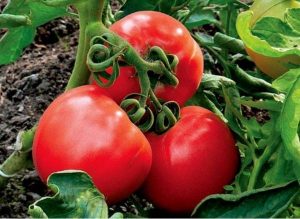 The varieties of Siberian selections are resistant to fungal diseases and resistant to weather conditions.
The varieties of Siberian selections are resistant to fungal diseases and resistant to weather conditions.
Growers of tomatoes in greenhouses cannot say that tomatoes are affected by diseases. However, the gardeners who grew the “king” in the garden were also very pleased with the results.
Advantages and disadvantages
Tomato "King early" has several advantages:
- early fruiting and ripening;
- large fruits;
- resistance to diseases and weather conditions.
Among the disadvantages of this variety:
- low yield;
- need for tying and fixing.
Features of growing varieties
The manufacturer indicates that the grade is early. Given this figure, sowing of seeds can be carried out at the end of March.
Growing seedlings
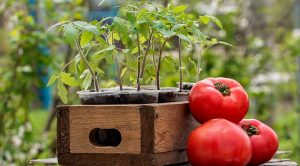 In order for the seeds to sprout amicably and quickly, they must be “revived”.To do this, just put the seed in a damp cloth, then in a plastic bag and send it to a warm place for 2-3 days.
In order for the seeds to sprout amicably and quickly, they must be “revived”.To do this, just put the seed in a damp cloth, then in a plastic bag and send it to a warm place for 2-3 days.
Over time, opening the package will immediately see the living, with the signs of life, the seeds of them should be sown.
Prepare the soil
Soil mix can be purchased universal, for growing seedlings or cook yourself. For this we use:
- fresh humus;
- herbal compost;
- garden land.
Humus can be from any farm animals, but matured, lain for at least 1.5 years. Compost should be structured, homogeneous, sifted. Garden soil is taken from the vegetable garden, but only from those places where in the last 2-3 years the steepbed plants have not grown.
Sowing
Seeding is carried out in plates by the group method. For this:
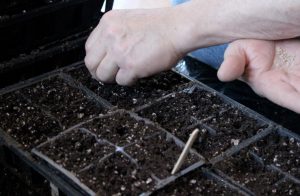
- The pot is filled with soil 3-4 cm;
- We condense;
- Spread the seeds 2-3 cm apart from each other;
- We cover with the earth on 1-1,5 cm;
- Pour through a sieve with warm water or spray from a spray bottle;
- Cover with glass or plastic film;
- Expose in a warm place for germination.
Picks
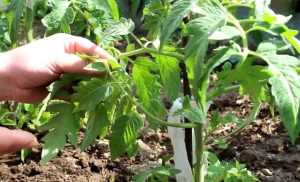 As soon as two true sheets are formed, they dive. In order to translate the core root system of a tomato into a fibrous root, to make it more extensive for the absorption of nutrients, it is necessary to tear off the root by 1/3.
As soon as two true sheets are formed, they dive. In order to translate the core root system of a tomato into a fibrous root, to make it more extensive for the absorption of nutrients, it is necessary to tear off the root by 1/3.
Next, we plant the plant in an individual cup filled with a nutrient mixture to the very cotyledon leaves.
When planting, care must be taken that the individual pot was initially filled only 2/3 with primer. When the sprout grows, the earth will fill up, and the stem will be able to form an additional root system.
Transplant into the ground
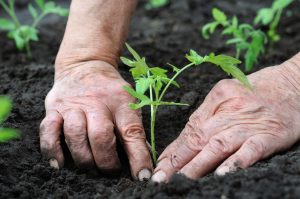 The optimal age for transplanting seedlings into the soil is 55-65 days. If the seedlings are in individual pots, then it tolerates the transplant well. It is possible to replant into a greenhouse at any time, but for planting in open ground, you need to wait for a period when return frost is no longer possible.
The optimal age for transplanting seedlings into the soil is 55-65 days. If the seedlings are in individual pots, then it tolerates the transplant well. It is possible to replant into a greenhouse at any time, but for planting in open ground, you need to wait for a period when return frost is no longer possible.
Since the variety is early and quickly starts flowering and fruiting, a feature of its transplant is the preparation of the site. Any vegetables other than solanaceous can be a predecessor for culture, but a special requirement is presented to the place of cultivation, it should be:
- sunny
- protected from the winds;
- with light, nutrient soils.
Care
To get early and abundant fruiting, you need timely:
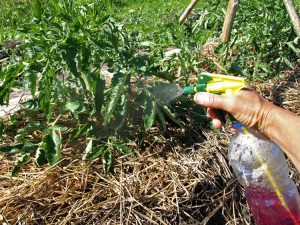
- watering;
- top dressing;
- mulching;
- formation;
- fungicide treatment;
- tying shoots.
Watering
The root system of a plant can consume nutrients from the soil only in a dissolved form. As soon as the soil under the bush dries out, growth stops and cell aging begins. In order to avoid such processes, timely and regular watering is necessary.
See also: Tomato "Pink Honey". Variety description
Water for irrigation should be 2-3 degrees above ambient temperature. The rate of watering is such that the entire earthy lump is completely soaked.
If the tomato growing area is southern and summer heat dries the soil, then mulching of the soil around the tomato shoot is necessary.
Top dressing
Early tomatoes need more thorough feeding.They do not have the ability to expect nutrients, since the ovary is formed earlier than that of the middle and late ripening.
To have time to "submit" to the plant body and nitrogen and phosphorus-potassium fertilizers, supplements are combined.
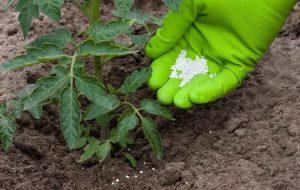
- The first feeding is carried out in 1.5-2 weeks after landing in open ground. For her, 1 tbsp dissolves in a bucket of water. spoon of ammonium nitrate and 1 tbsp. spoon superphosphate. Under each plant add 0.5 liters of solution with premature abundant watering;
- The second feeding is carried out 1.5 weeks after the first solution of organic fertilizers. For this purpose, you can take both cow dung and other farm animals. The solution is prepared in a ratio of 1:10. Very good solution can be prepared from bird droppings. However, in this case the proportion will be 1:20.
- The next feeding done in 1.5 weeks. In a bucket of water, add 1 tbsp. a spoonful of potassium sulfate.
Experienced growers carry out continuous feeding with each irrigation. To do this, they make a solution for this recipe:
On a bucket of water:
- ammonium nitrate - 2 tbsp. spoons;
- potassium sulfate - 2 tbsp. spoons;
- superphosphate - 2 tbsp. spoons;
- manure - 1 kg.
All this is dissolved, and before watering, one liter of "mother liquor" concentrated solution is added to each bucket of irrigation water.
Shaping
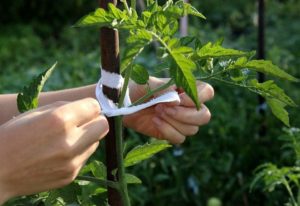 "The King of the Early" tomato is short and deterministic. However, a small shrub cannot independently sustain weighty fruits of 200 g so that the shoots do not break off. Naturally he needs a fixation.
"The King of the Early" tomato is short and deterministic. However, a small shrub cannot independently sustain weighty fruits of 200 g so that the shoots do not break off. Naturally he needs a fixation.
As soon as the seedlings have been planted, the peg clogs and the fixation begins.
Pastage grade does not require, but if a lot of stepsons are formed, then this inhibits the growth and ripening of tomatoes. In order to avoid delay in the inflorescence tab, it is better to remove all the stepchildren below the first inflorescence, and then to form, depending on the degree of vegetative development.
Treatment
No matter how stable the variety, if the weather conditions are not in favor of the thermophilic tomato, treatments are needed.
The best results are achieved with the alternation of fungicidal preparations. Since they all have different waiting times from the time of processing to the time of consumption of vegetables, it is necessary to carefully monitor this. The “king of the early” quickly arrives at the table, and therefore the drugs are needed with a short waiting period.
See also: Tomato "Negro": original colors and harmonious taste
The seed market is replete with high-quality varieties and hybrids. Having carefully considered the proposals, you can choose those that have worked well over the years. Whatever variety you choose, compliance with agrotechnics will allow you to get a decent harvest.
Video: Proper care of tomatoes


